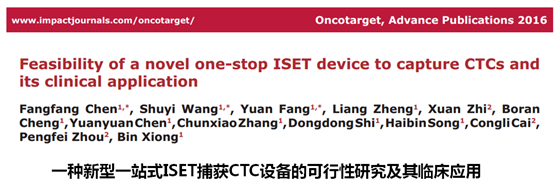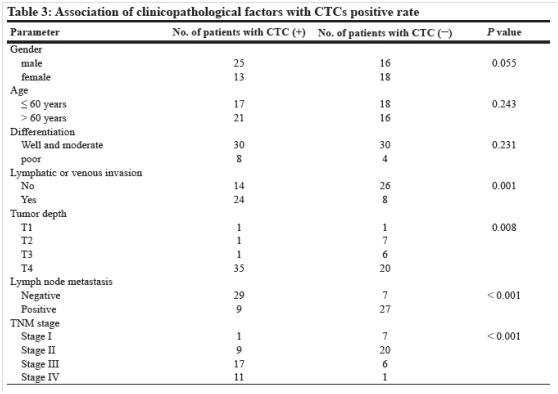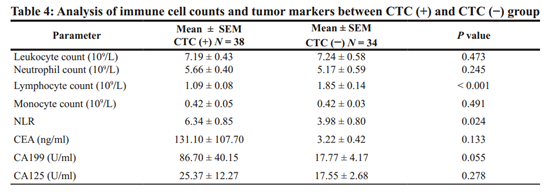For the first time, doctors found a significant correlation between neutrophil/lymphocyte ratio (NLR) and CTC detection in patients with colorectal cancer. Professor Xiong Bin from the Central South Hospital of Wuhan University recently published a research paper on the detection of circulating tumor cells (CTC) in colorectal cancer patients in the internationally renowned magazine Oncotarget (IF=5.008) (see the figure below for the title). This research is the result of cooperation between Professor Xiong Bin and the Zhiyou Medical R&D Department. A total of 72 patients with stage I-IV colorectal cancer were enrolled in the study and CTC were performed on these patients using the CTCBIOPSY platform. The study found that the positive rate of CTC test in these 72 patients was 52.8% (38/72), and the positive rate of CTM (circulatory tumor micro-plug) was 18.1% (13/72). The positive rate of CTC detection was significantly correlated with lymphatic or venous infiltration, depth of tumor invasion, lymphatic metastasis and TNM staging (P<0.01). The results suggest that the detection of CTC in patients with advanced colorectal cancer indicates a poor prognosis. (This table is quoted from the literature: Xiong, et al. Oncotarget. 2017, 10; 8(2): 3029-3041.) The study also found that patients with positive CTCs had significantly lower mean lymphocyte counts than patients without CTC (1.09 x 109/L vs 1.85 x 109/L, P < 0.001), neutrophils/lymph. Cell ratio (NLR) was significantly different between CTC positive and negative groups (6.34 vs 3.98, P < 0.024). The results suggest that the number of CTCs is negatively correlated with the immunity of tumor patients, that is, the better the immunity of tumor patients, the more difficult it is for CTC to survive in the peripheral blood circulation system. In recent years, many literatures have reported that NLR can be used as an independent prognostic factor for cancer patients. This study is the first in the world to link CTC detection of colorectal cancer patients with NLR, showing the dynamics of immune cells and CTC. The importance of association and immune system to prevent distant metastasis of cancer also reveals the value of CTC testing for assessing the efficacy of immunotherapy! (This table is quoted from the literature: Xiong, et al. Oncotarget. 2017, 10; 8(2): 3029-3041.) The author of the paper, Professor Xiong Bin, commented: CTC can spread with blood circulation, adhere to vascular endothelial cells and invade different tissues and organs. Detection of CTC can give us a deeper understanding of the process of metastasis. At the same time, CTC detection can be used as a real-time "liquid biopsy" to monitor tumor biological behavior more conveniently, and to detect potential tumor metastasis earlier. Therefore, the detection of CTC has important clinical significance, not only can achieve early diagnosis, efficacy monitoring, and even through the analysis of the molecular biological phenotype of CTC, to achieve individualized treatment. The CTC capture analysis system used in this study is based on the principle of membrane membrane for CTC capture, followed by subsequent automated Wright staining and reading, forming a one-stop analysis system from capture separation to identification - ISETos (One-Stop Isolation) By Size of Epithelial Tumor cells, ISET) is the CTCBIOPSY system. ISETos uses CTC and CTM to differentiate the white cells from the average cell size. The nano-separation film with a large number of 8μm pores has achieved high capture efficiency. At the same time, in situ observation analysis is made possible by the application of nanoscale films. However, since ISETos is still based on size-size capture, there is still controversy about CTC capture of Epithelial-Mesenchymal Transition (EMT), so it is necessary to further process the membrane to achieve double separation of ISET combined antibodies. The system is further upgraded for comprehensive capture and analysis of CTCs. At the same time, in view of the molecular phenotype of CTC, ISETos needs to improve molecular biology analysis such as downstream deep sequencing to facilitate clinical treatment of different subtypes of CTC and to monitor the efficacy of tumor treatment. However, in general, ISETos has broad prospects for CTC capture and molecular biology research, and can effectively analyze the correlation between CTC and clinical pathological features of tumors, and rely on reasonable workflow and technology platform to conduct in-depth study of CTC. The role of malignant tumor development, recurrence and metastasis has theoretical and practical value for understanding and preventing tumor progression, discovering new therapeutic targets, and achieving precise treatment. ___________________________________________________________________________________ Professor Xiong Bin's research team introduced: Xiong Bin, MD, professor, chief physician, doctoral tutor. Director of Oncology Surgery, Central South Hospital, Wuhan University, Director of Department of Oncology. Professor Xiong Bin's team has focused on the mechanism of invasion and metastasis of malignant tumors for many years. Through different technical platforms, CTC capture and follow-up of patients with intestinal cancer, stomach cancer, liver cancer, etc., from the perspective of liquid biopsy, a large number of innovative clinical and basic Research; at the same time, it has been engaged in the research of related mechanisms of CTC invasion and transfer, and has undertaken one National Natural Science Foundation in this field. The results of relevant research work have been published in "Advanced Materials", "Theranostics", "International Journal of Nanomedicine", "Oncotarget", "Free Radic Biol Med" and other magazines, which have attracted the attention of domestic and foreign counterparts. It provides a theoretical basis and practical basis for the understanding, diagnosis and treatment of recurrence and metastasis of digestive tract malignant tumors. Fertilizer Spreader,Manure Fertilizer Spreader,Tractor Fertilizer Spreader,Pto Driven Fertilizer Spreader Taizhou Yingtian Agricultural Machinery Manufacturing Co., Ltd. , https://www.sakuradaagc.com

